Dirty nappies, non-stop crying, no more freedom nor money to do what you like. A century ago, having children would have been an inevitability. Fate, if you like. However, thanks to movements such as the workers’ rights which enabled more women to enter the workforce, and the contraceptive revolution, people are now more free than ever before to choose their life’s path, and thus to choose whether to have children or not.
For many, children are still a natural step in the progression of life, but an increasing amount of people are realising that parenthood is simply not for them. From environmental anxiety to craving flexibility, there is a multitude of reasons for why individuals are deciding to be childfree.
We have interviewed ten childfree volunteers to get an insight into the reasons behind their decision, and to demystify the not-so-new phenomenon of the childfree lifestyle.
Childfree vs childless
Firstly, it is important to make the distinction between the terms ‘childfree’ and ‘childless’, which can get confused. Childfree refers to people who are voluntarily without children, i.e., they have chosen not to reproduce (nor adopt). Childless on the other hand, is a term used for people who do want a child but are unable to have one, such as in the case of infertility.
“I like the freedom of not worrying about someone who is dependent on me, but also I can book a holiday and not worry about school, or I can move to another country without having to consider school and children as a factor.”
Paige, 26, UK
Why be Childfree?
Every important decision in life involves weighing up the advantages and disadvantages of possible outcomes. This is especially relevant for a decision that could end up in bringing a tiny little human into this world. Childfree people often get asked why they don’t want to have a child, and after interviewing the volunteers it is evident that most have thought about the answer thoroughly and for them, the disadvantages tip the scales against parenthood.
Let us look at the top reasons given for not wanting a child. Out of the ten volunteers interviewed, eight said that they don’t want to have a child because it would have a major impact on their free-time or flexibility. The second biggest reason, given by seven volunteers, was money. Specifically, volunteers were worried about not being able to afford a child or they wanted to save money up for other important life events, such as buying a house or holidays. As one anonymous volunteer contemplated, “Imagine you work a crappy exhausting job and instead of coming home to relax in your free time, you have another job to attend to, except this one is 24/7 and you don’t get paid.” Other reasons given included being afraid of pregnancy and birth, not liking children, and not wanting to contribute to overpopulation.
A UK survey of 344 childless individuals of various ages reflects the above. The study found that the top three reasons (after being too old to raise children) were: not wanting an impact on lifestyle, the costs being too high, and worrying about overpopulation.
Further reasons included mental health and genetic disorders – either being worried about passing on a health condition or being unable to adequately care for a child due to suffering from a condition. An anonymous woman from the US told us “I have a genetic condition (hypermobile Ehlers-Danlos syndrome) that could be passed on to a biological child and would make taking care of a child of any kind extremely difficult.”, and another volunteer admitted that despite thinking she would make a good mother, parenthood is not worth the emotional effort. “I just do not want the commitment and sacrifices that come with having a child. I am simply prioritising my mental health.”
Take a look at some in-depth answers from the volunteers.
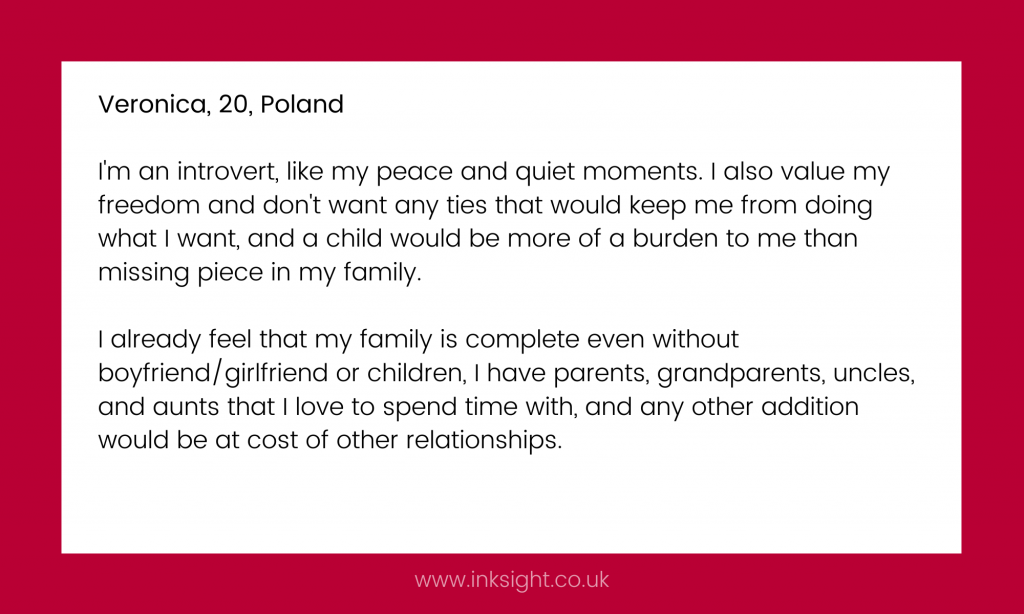
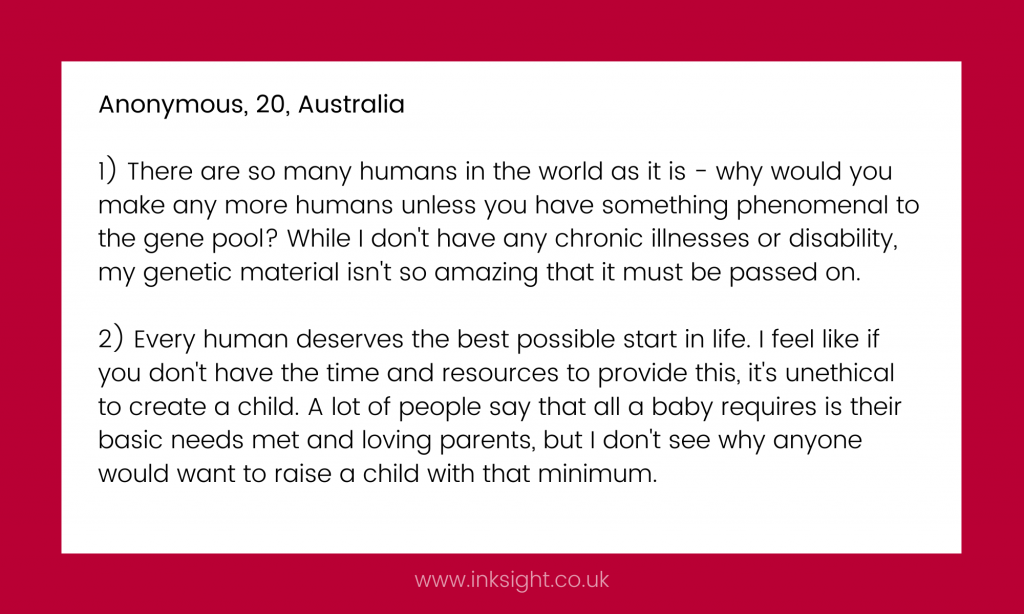
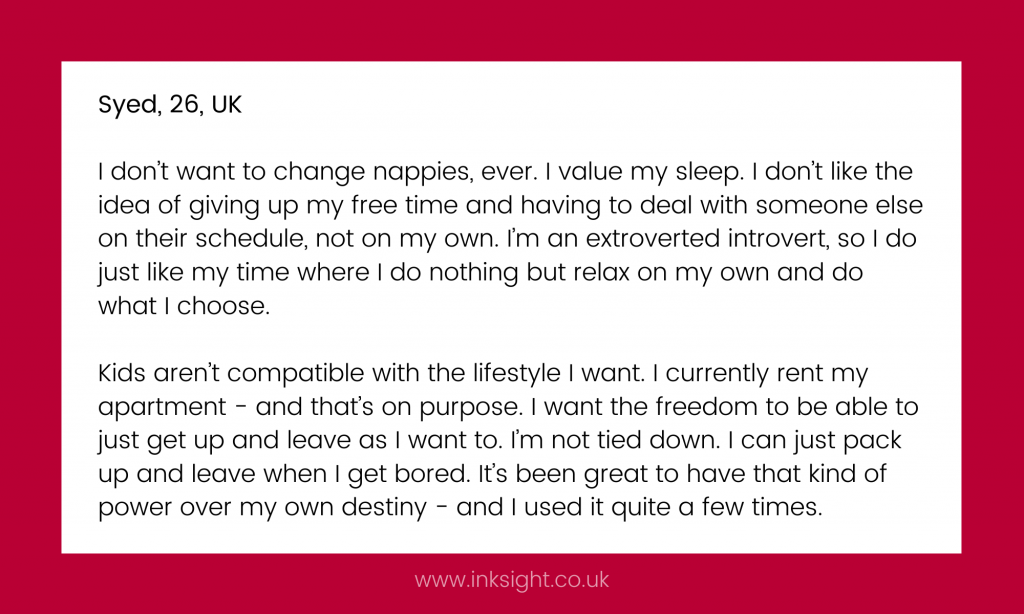
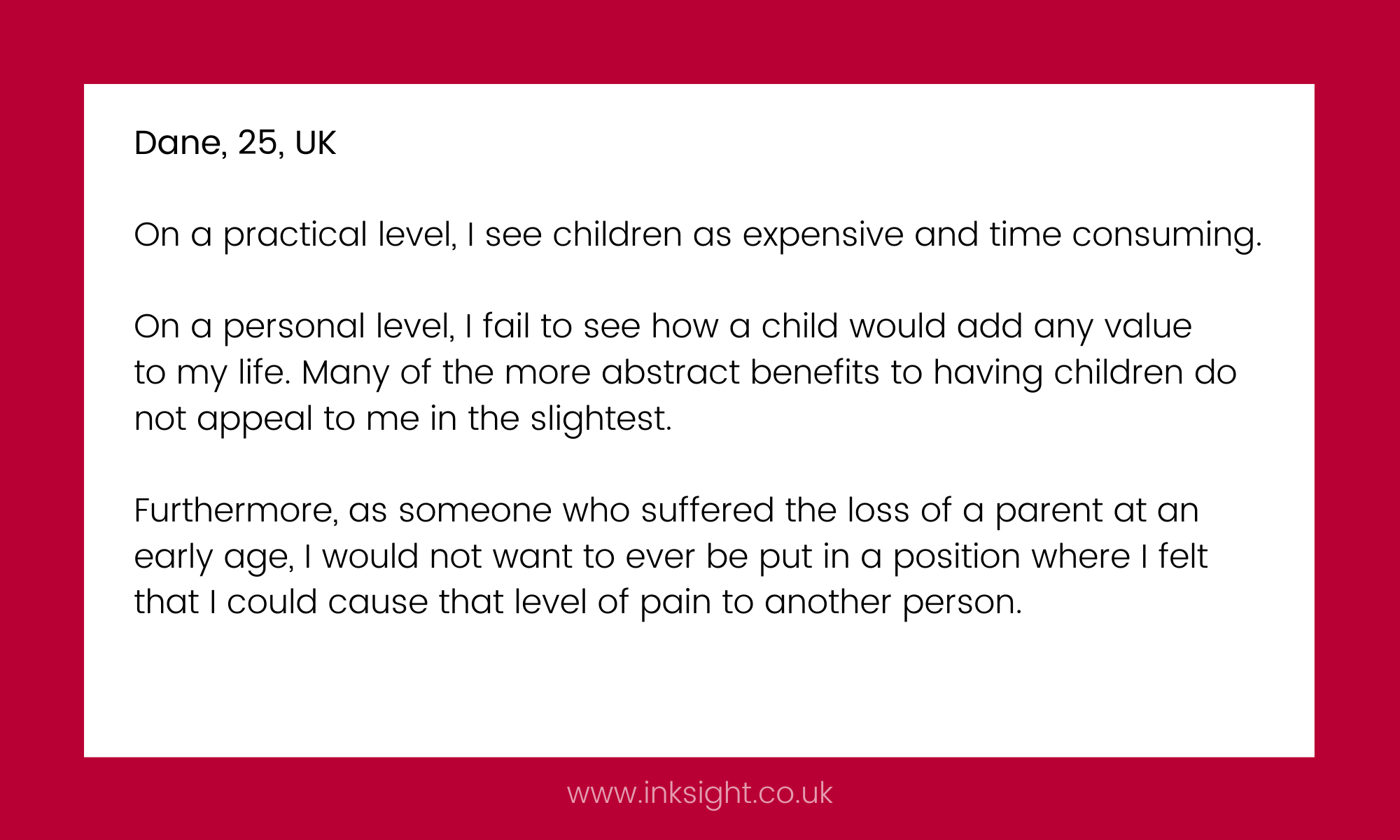
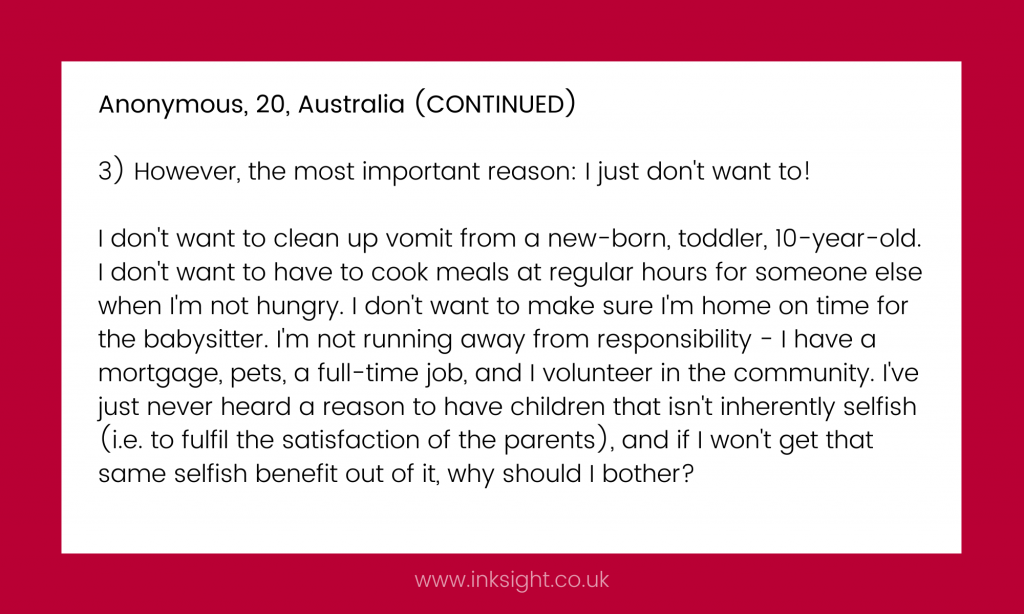
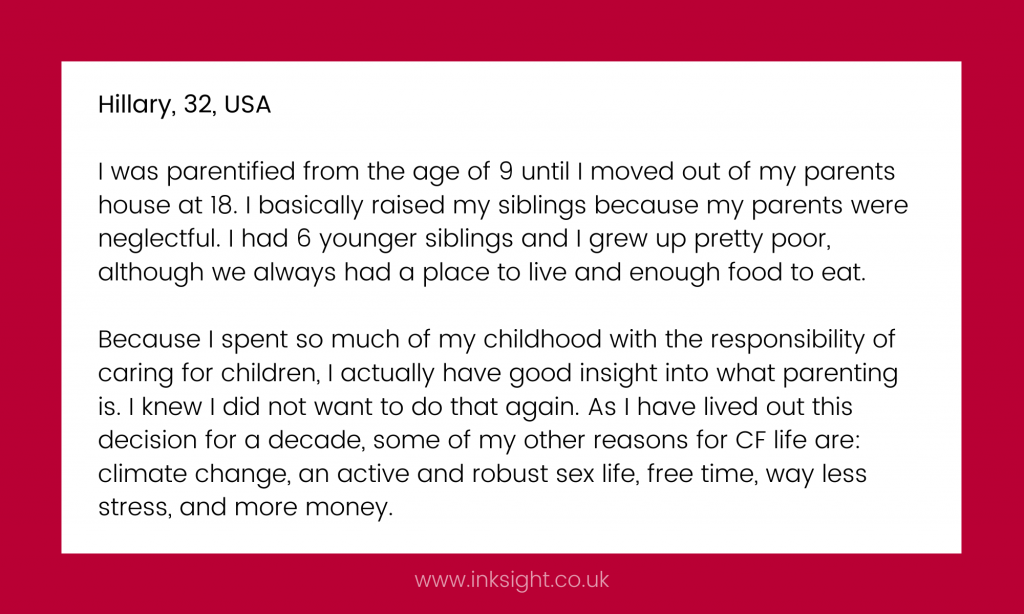
When did you know you were childfree?
Deciding to be childfree is often a long process that involves a lot of introspection into one’s personality and re-evaluation of life goals. Dane, a twenty-five year old man from the UK, pointed out, “Having children used to be part of my life plan, not because of some deep desire to have them, but because I thought it was a natural part of life that happened to most people at some stage. As I grew older, I realised that not only was this not the case, but that in fact, the life and the lifestyle I wanted was incompatible with children in it.”
For Syed, who is a twenty-six-year-old developer from the UK, the childfree lifestyle became a certainty later in life, while he was dating his partner. “Quite early on in the relationship we talked about what would happen if she did get pregnant and she always said she’d get an abortion straight away. There were a few scares till she got on the pill, and then a few scares after she was on the pill which we later found out was linked to endometriosis. But during all this time, the idea of kids became less and less appealing. It wasn’t like a switch flipped one day – but over time I just decided I don’t like kids, I don’t like the idea of kids and I don’t want to raise kids.”
However, there are some people who made the decision sooner than others, such as in the case of two female volunteers. Veronica, from Poland, came to the realisation at barely five years old when she had reluctantly become a caregiver for a pet. “I didn’t have much contact with younger kids and didn’t know how much effort it takes to raise a child. I was sitting on a blanket in my garden when my cat came to me and started giving birth. I said to my grandma ‘Oh look the rats are coming out of her, is she sick? Shouldn’t she give birth to little cats?’ My grandma likes to remind me those words on every family meeting as a joke. Afterwards, my cat didn’t want anything to do with her kittens, so it was my responsibility to “raise them”. Two to three months later we gave most of the cats away. I was so relieved, tired, and knew that if it was that hard to raise kittens, raising a human child would be so much harder, tiring and not fulfilling at all. I enjoyed the “kodak moments” but I was generally unhappy in that situation and felt trapped.”
The other young woman, from Australia, shared the sentiment. “Even when I was very young, I had no interest in “baby dolls” or other toys that simulated motherhood. I never had any of those toys bought for me either, so I’m not sure how much of that was me or the influence of my parents. When I was about 15, I started saying that I don’t see kids in my future, but if I end up changing my mind when I’m older then so be it. Now I am older, and I still don’t ever see raising children in my future.”
Then there are some individuals who figure it out in a moment of enlightenment. Hillary, a thirty-two-year-old nurse from the US told us “I decided to be childfree when I was 22. I had been married for a couple of years and I was thinking about how amazing my life was with just me and my partner and how happy I was. It hit me like a lightning bolt that it could be this way in the future and that I didn’t have to have kids.”
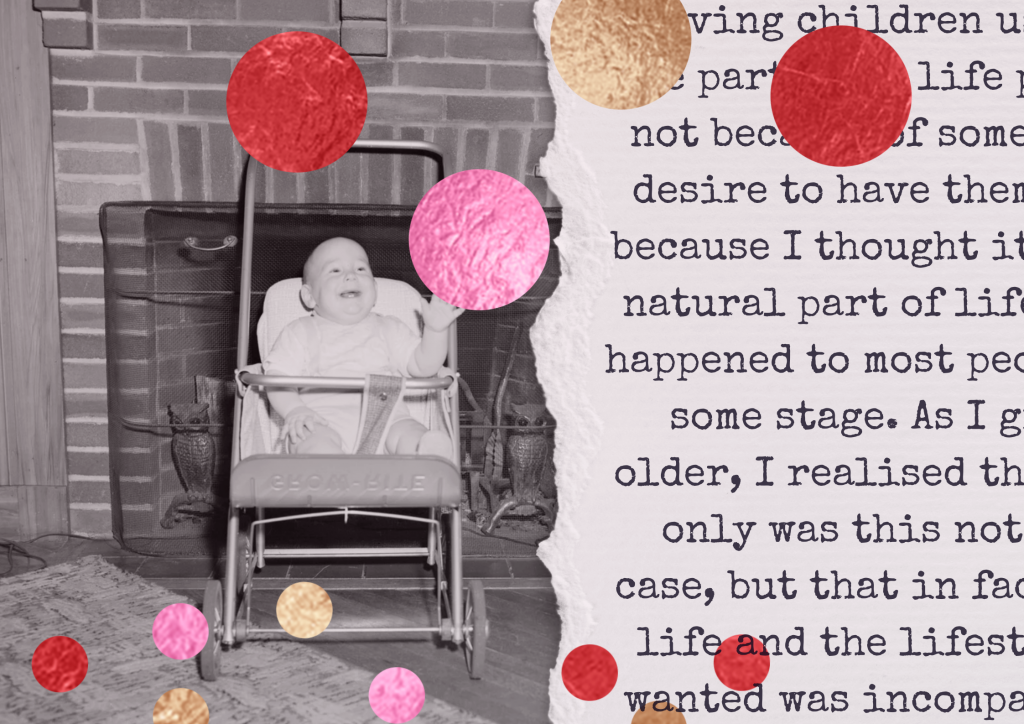
“Looking at online communities like r/regretfulparents makes me think many people have an idealistic vision of what it would be like to raise a child, then reality hits once the baby is born and they realise they hadn’t really considered the massive negative impact a baby has on all aspects of your life, particularly relationships.”
Anonymous, 28, UK
What does the research say?
A lot of the research out there offers mixed views on the childfree lifestyle and its effect on different aspects of one’s life. We have looked at studies related to relationships and loneliness in particular, as they are often brought up in conversations about being childfree. What if you end up lonely? Who will visit you when you’re old? What if the love of your life wants a child? These are some of the questions childfree people have to face from family, friends, and the wider public alike.
There are countless stories on the internet about couples who tried to save their marriage by having a baby. Research done on couples before and after having a child shows that it generally isn’t a good idea. In fact, having a child has shown to have a long-lasting negative effect on romantic relationships. A 2003 study found that parents reported lower marital satisfaction compared with nonparents, and the more children a couple had the more dissatisfied they were with their marriage. The study pointed out that marital satisfaction decreased after the birth of a child due to role conflicts and restriction of freedom. More recently, a piece of research featured in the New Scientist suggested that parents are happier than non-parents, but only after their children move out and turn into being a source of enjoyment rather than a cause of stress. Parents whose children have left the nest tend to feel happier because of the sleep, money, and free time that returns to their life.
When it comes to loneliness down the line, the results are largely inconclusive and tend to be dependent on the support available to the elderly. As the study above pointed out, older parents feel “greater life satisfaction and fewer symptoms of depression than people without children”, with the caveat of not actually living with their children. A further study found that there was no significant increase of the prevalence of loneliness and depression in childless older individuals. However, men who were divorced, widowed, or never married were more likely to feel lonely or depressed than women in the same position. This certainly raises some questions about gender and ageing childfree. Other research found that having children “increased the likelihood of having [a] social [life] and maintaining connections.” It was suggested that this is due to childless older people not having access to “the practical help that enables participating in the community, e.g. someone to drive them to activities”. This highlights the gaps in care and provisions for our oldest generations, and reiterates the importance of initiatives such as the Ageing Well Without Children who aim to improve the living conditions of elderly people without adult children.
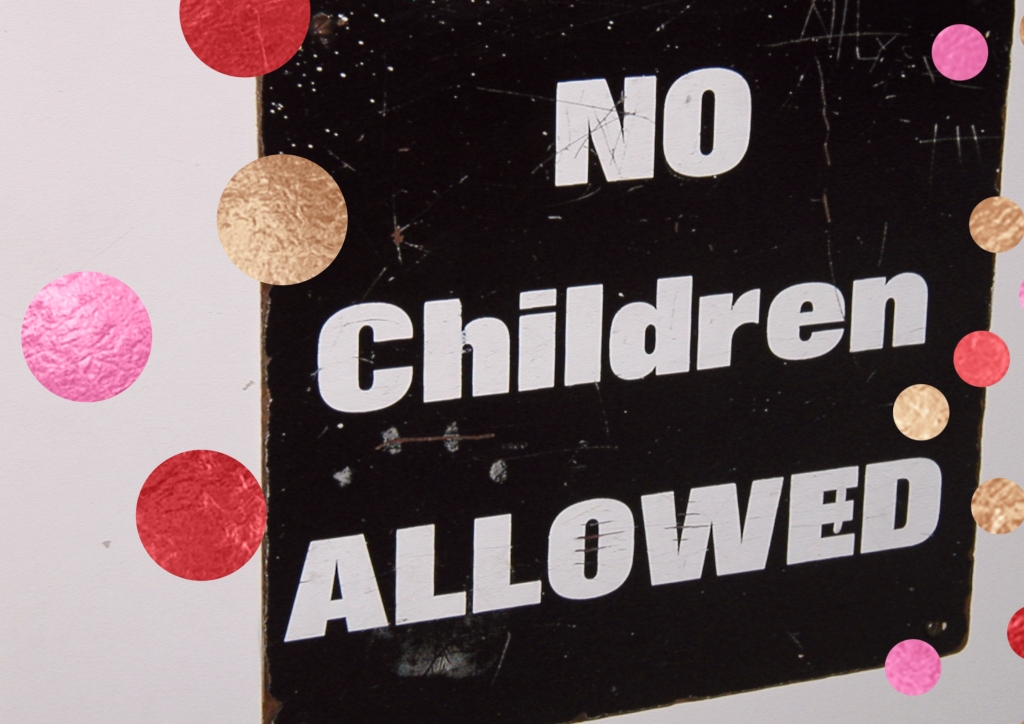
Childfree Women – Fear of Birth
An anonymous volunteer considered “Maybe if I was a man, I would want children.”
The choice to have a child comes with a lot more effort and potential issues for women than for men. The way a pregnancy can change the body, and the way birth can permanently hurt it is enough to make plenty of women decide to be childfree on the spot. For instance, take vaginal tearing during childbirth. How rare do you think it is? The answer is: not rare at all. In fact, vaginal tearing is extremely common – about 90% of first-time mothers end up with some degree of tearing during birth. Most women will experience second degree tears to their perineum which require stiches. Furthermore, studies show that 1 in 4 pregnancies end in loss of the child during or after pregnancy, and a very small percentage of women still die as a result of the pregnancy or mental health issues associated with it. Other data states that 8 in every 100 women will experience complications during their pregnancy that may harm the mother or the child, and let’s not forget that postpartum depression (PPD) affects up to 15% of mothers. In light of all this potential physical and emotional pain, it’s easy to see why some women do not want to follow society’s expectations and become mothers. The cost of motherhood is high, and now that women have more choices and more control over their bodies and their life, can you blame them for choosing to avoid motherhood?
“What if you change your mind or regret it?”
Non-parents hear this very often. Even though people are free to choose whether or not to have a child, the choice is still often met with criticism, disbelief, or even outrage from others. This is especially true for women, who for centuries were reduced to the social roles of mothers and caregivers.
There is some anecdotal evidence that most childfree people do not regret the choice later in the future, although more substantial data from older non-parents is required. It is conceivable that there will be individuals who later regret their choice to remain childfree, just as there are many individuals who regret having children. However, what needs to be addressed is how the lives of regretful non-parents differ from those who never regretted their choice. Factors such as a support networks, extended family, or good health may affect whether people are happy with their decision to be childfree which is in need of further research.
It is undoubtedly annoying when people, especially strangers, assume they know what’s best for you. Being told that you will change your mind about something denies the autonomy of choice, and it’s one of the quickest ways to irritate a childfree person.
When it comes to our volunteers, most of them have experienced being told they will change their mind or regret their choice later. When asked about their usual response, the answers varied from indifference to anger.
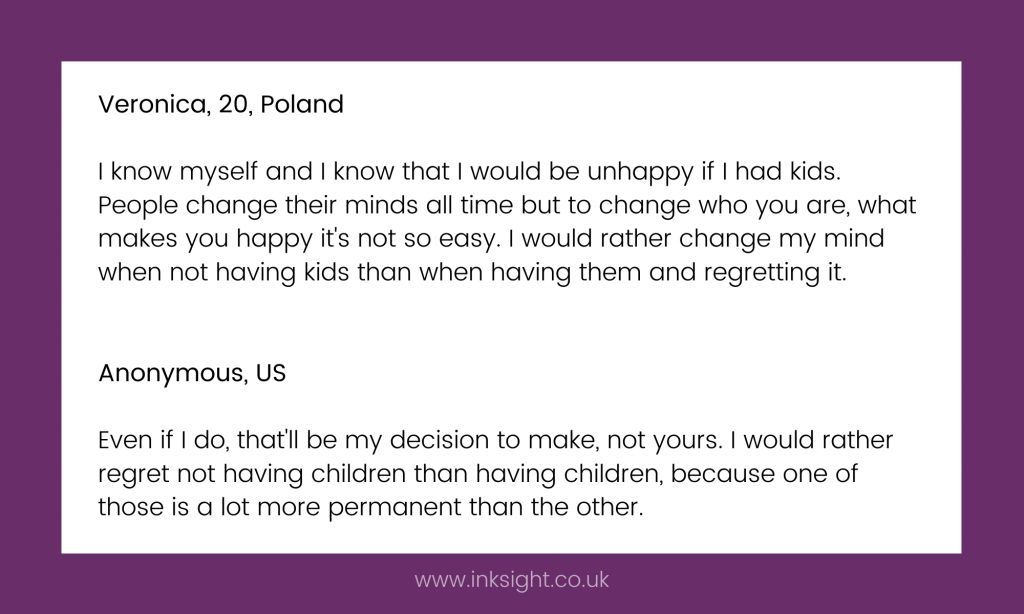
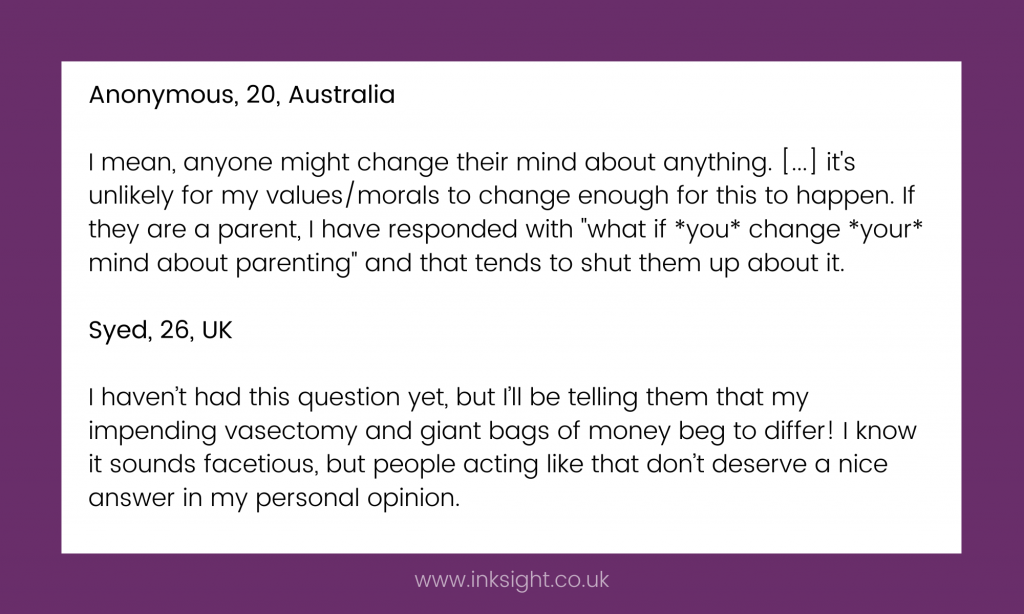
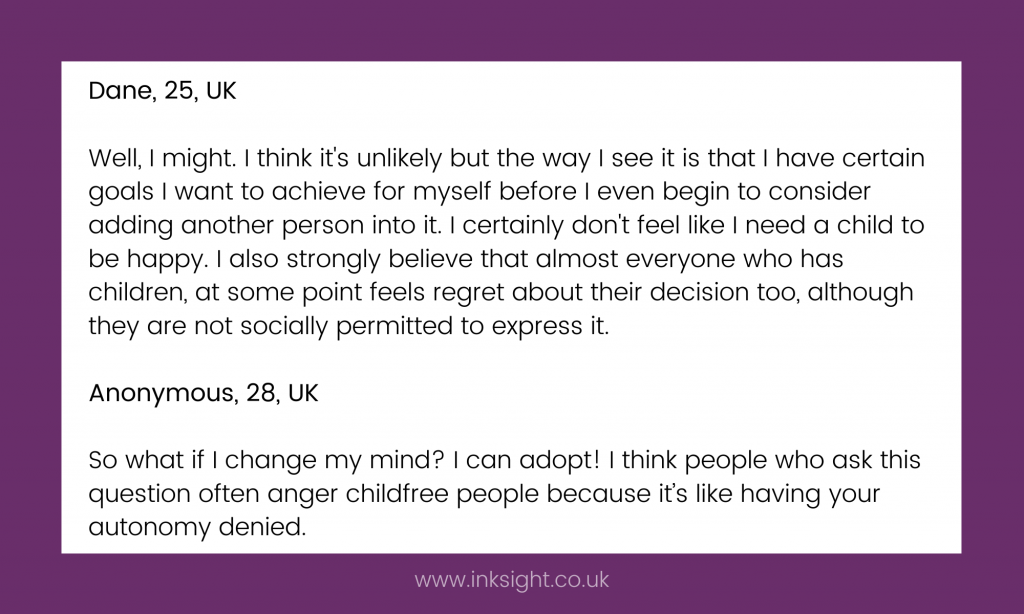
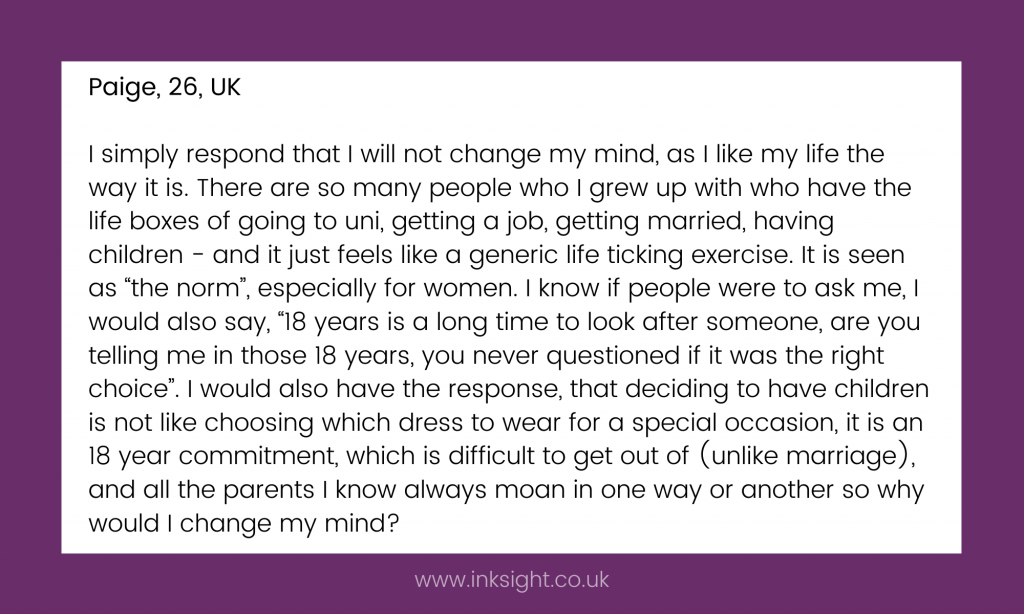
Difficult Parts of Being Childfree
As carefree as it may sound, childfree life is not without difficulties. Many childfree people have to deal with criticism and rejection from friends and family. Choosing not to have children is still frowned upon in our society. Historically, voluntary childlessness was seen as a sign of insanity; it was unnatural to not want to do something that your body was “made” for. These days, it’s seen as selfishness or a political statement.
“My mom was upset when my partner had a vasectomy, but I don’t have a lot of contact with her.”
Hilary, 32, US
The majority of the volunteers interviewed said they are openly childfree, however, most also admitted that they have experienced disapproval from friends and family members. A young volunteer from the US is an example of what some childfree people have to deal with. “My mother is accepting of me, but my grandmother and my father are not. They try to get me to change my mind constantly, and my father in particular is very aggressive about it.”
Some people feel pressured to have children because they are afraid of their partner’s reaction. In some cases, couples break up after realising their life goals do not align. For Dane from the UK, his stance on children was the reason why he separated with his last partner. “She wanted lots of children, starting relatively soon and I wanted zero ever. It is hard to find a compromise in such a wide disparity.” Others find that being childfree can also put a strain on friendships, as one volunteer experienced. “It’s becoming difficult as more of my friends are getting pregnant and I just have less in common with them. It’s hard to catch up with friends who have a child because the child (no matter the age) takes so much of the attention. I’m friends with you, not your kid, and you are the one I want to spend time with.”
The workplace can be a source of discrimination and harassment against childfree individuals too. Non-parents’ are frequently treated differently to parents, and their free time is seen as less valuable than the time parents spend with their children. This leads to non-parents being expected to do extra work and can make it harder for them to get time off.
Despite the setbacks, an increasing number of people are choosing to be childfree and the decision to not have children is slowly gaining acceptance in society. There is still a long way to go, but eventually the term ‘childfree’ will cease to be a cause for moral outrage, once everyone finally accepts the fact that people are allowed to choose what to do with their life. Being alive in the 21st century has given us many opportunities, and one of the most important has been unavailable to most people in the past: the opportunity of choice. Those who are lucky enough to choose their life path ought to be encouraged to make a choice that will make them happy, not punished for exercising personal autonomy that is still being fought for in many areas of the world.
A big thank you to all the volunteers who participated in the interviews! Your answers were insightful and crucial to finishing this article.

Aleksandra Zolczynska
Founder of Inksight
Twitter: @alekzolcz

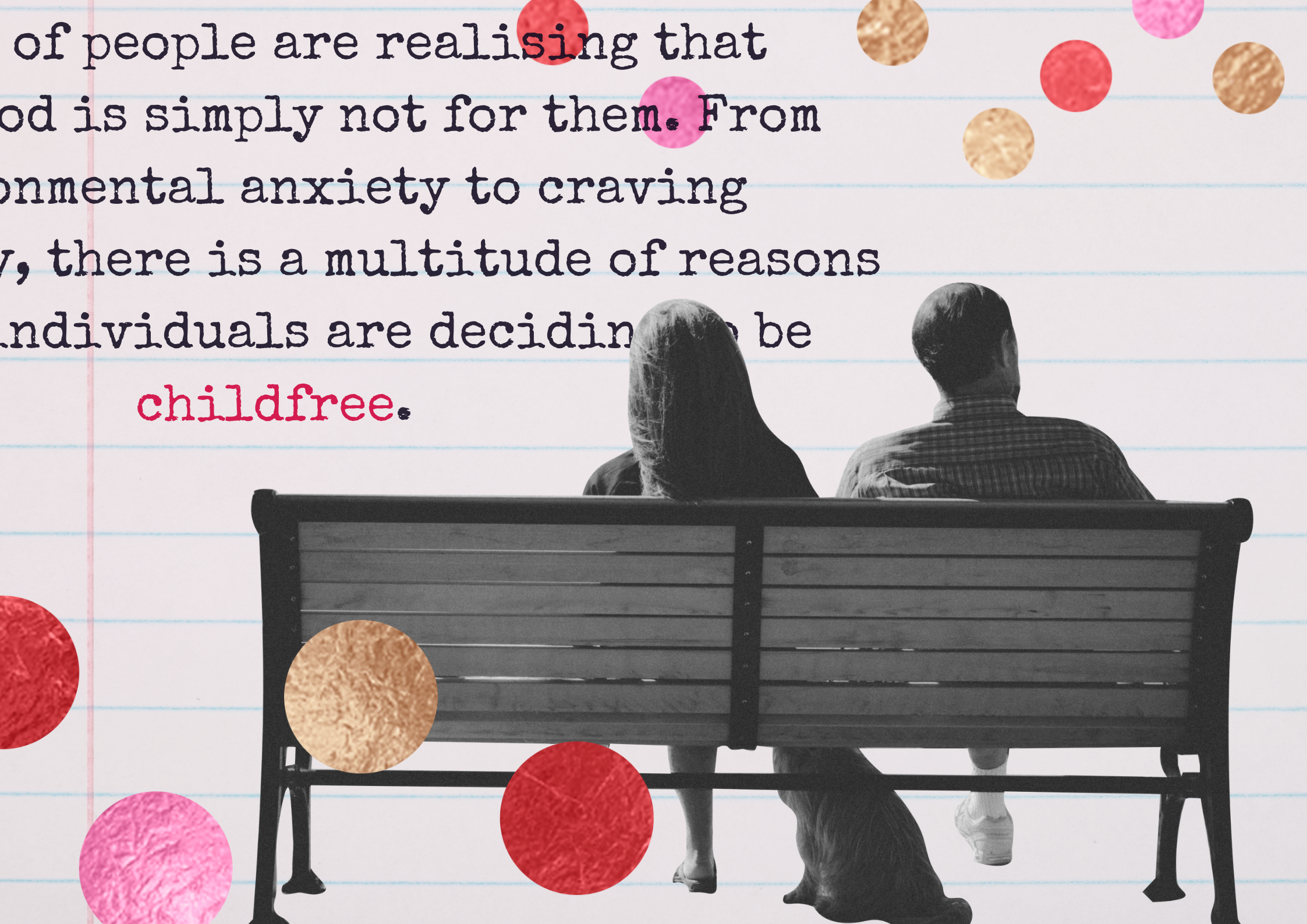

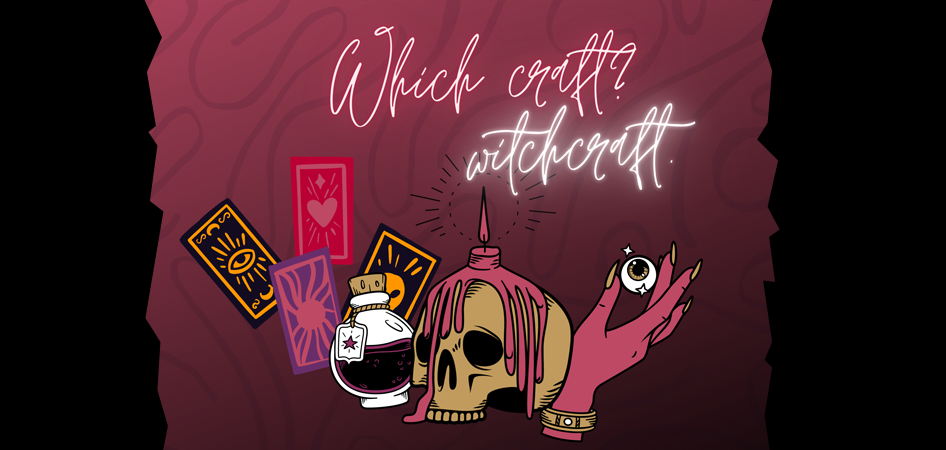
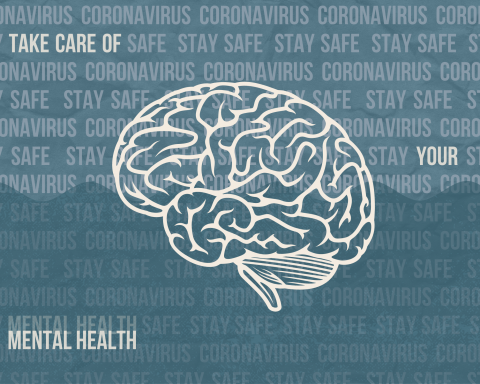

Overpopulation definitely resonates with me, so many people already exist. The planet is falling apart, and we collectively are to blame for that. On top of that, I simply have no desire for children. With the anonymity of the Internet comes more stories of parental regret, and I refuse to bring an unwanted or neglected child into the world.
I feel all of this very deeply. I’m still shocked that this far into the 21st century, people still recoil in horror when you say you don’t want children. Hopefully the next generation will be more aware of their freedom of choice than ours is.